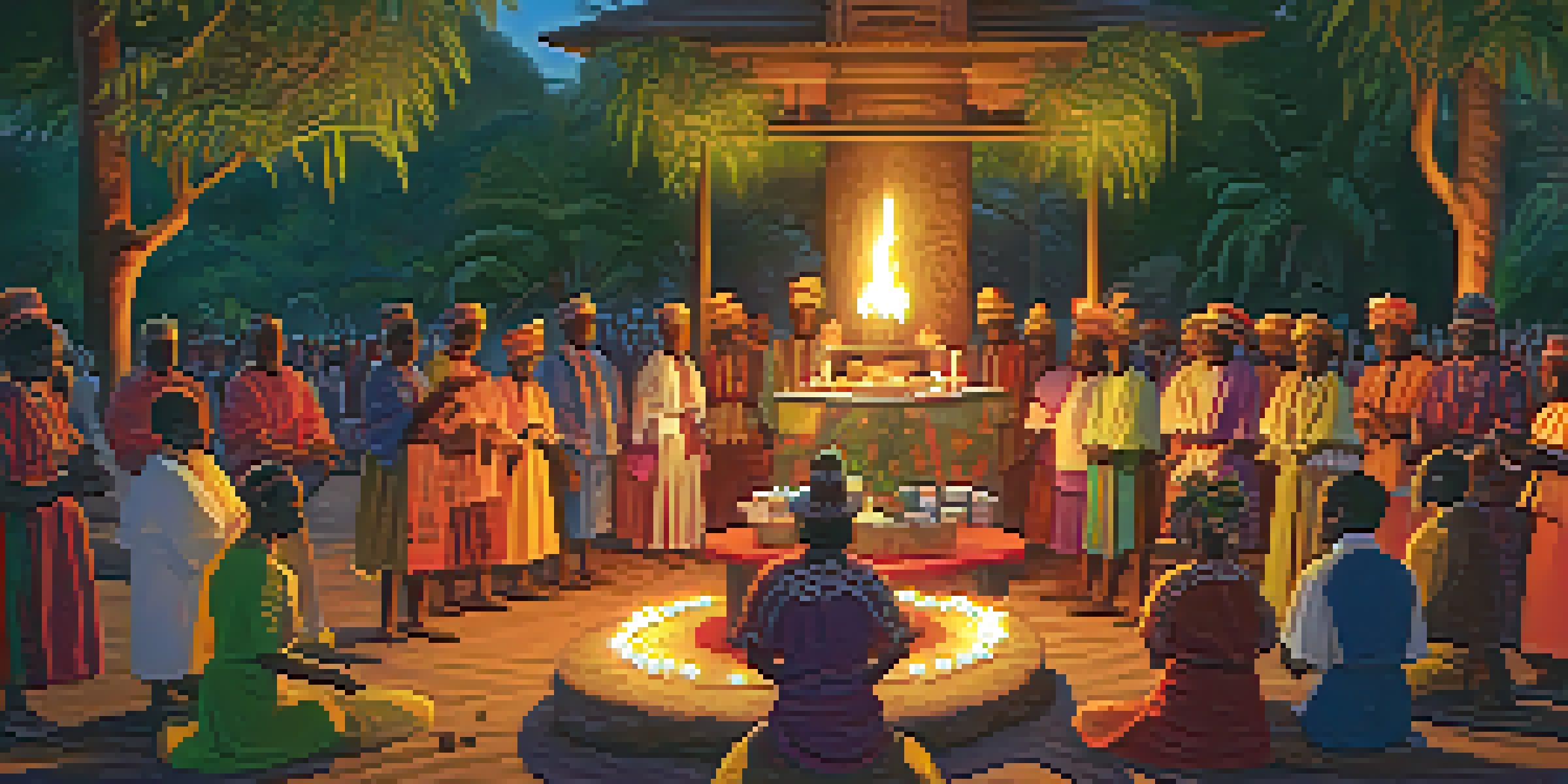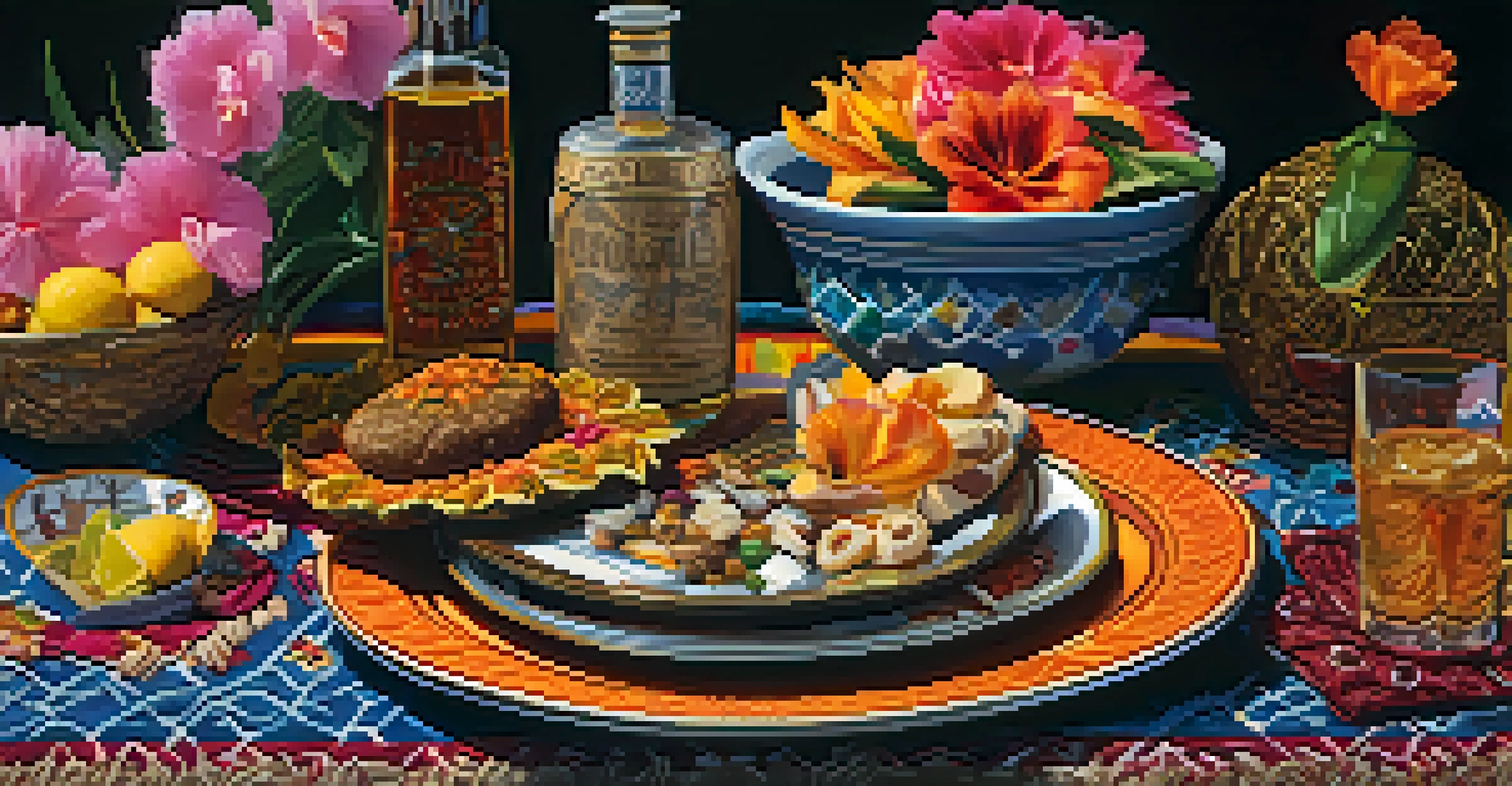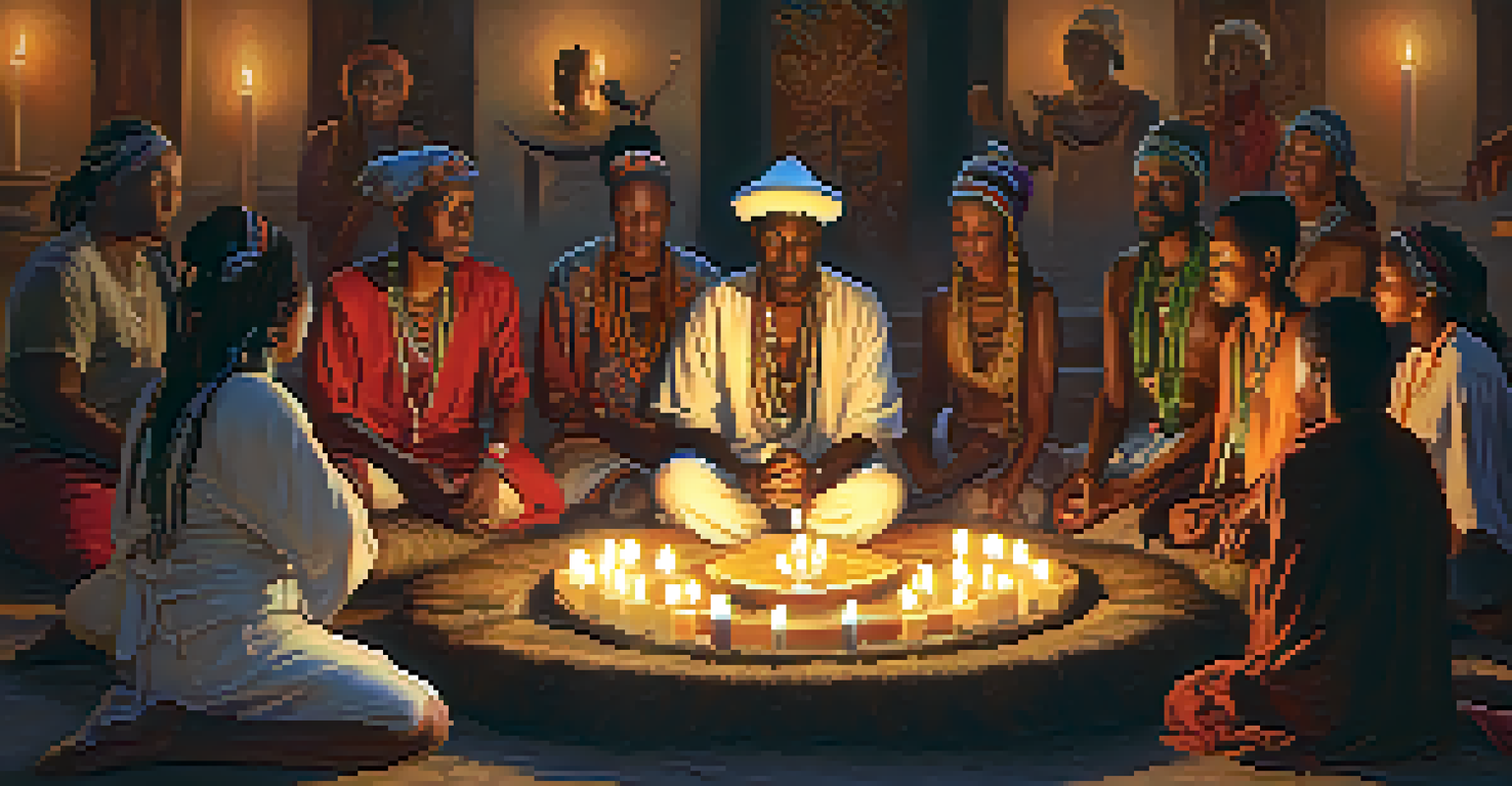Rituals and Ceremonies: The Heart of Voodoo Practice

Understanding Voodoo: A Spiritual Overview
Voodoo, often misunderstood, is a rich tapestry of beliefs and traditions rooted in African spirituality. At its core, it emphasizes a connection to the divine and the natural world. Practitioners believe in a pantheon of spirits known as 'Loa,' who play a vital role in daily life and rituals.
Voodoo is not just a religion; it’s a way of life that fosters community and respect for ancestral heritage.
These Loa serve as intermediaries between humans and the supreme deity, often guiding individuals through life's challenges. By honoring these spirits, practitioners seek blessings, protection, and guidance. Thus, Voodoo is not just a religion; it’s a way of life that fosters community and respect for ancestral heritage.
The heart of Voodoo lies in its rituals and ceremonies, which are designed to invoke and celebrate these spirits. Each ritual reflects the beliefs, values, and history of the practitioners, making it a deeply personal and communal experience.
The Role of Rituals in Voodoo Practice
Rituals in Voodoo are essential for maintaining balance in the spiritual and physical realms. They serve as a bridge connecting practitioners to the Loa, allowing for communication and interaction. Through these ceremonies, individuals can express their intentions, whether it's for healing, protection, or guidance.

Each ritual is unique, often tailored to specific needs or occasions. For instance, healing rituals may involve songs, dances, and offerings to invoke the assistance of a particular spirit. This personalized approach not only fosters a deep connection with the divine but also reinforces community bonds among practitioners.
Voodoo Connects with the Divine
At its core, Voodoo emphasizes a deep connection with the divine through the worship of spirits known as 'Loa.'
Moreover, rituals are often communal events, bringing together families and friends to celebrate and honor their beliefs. This collective participation enhances the sense of belonging and shared identity within the Voodoo community.
Common Types of Voodoo Rituals Explained
Voodoo rituals can vary widely, but some common types include initiation ceremonies, healing rituals, and ceremonies for protection. Each type serves a distinct purpose, yet all share the common goal of honoring the spirits. Initiation ceremonies, for example, mark an individual's entry into the spiritual community, often involving elaborate celebrations.
Rituals are a bridge connecting practitioners to the Loa, allowing for communication and interaction.
Healing rituals are particularly notable, as they address physical and spiritual ailments. These rituals may involve herbal remedies, prayers, and the participation of skilled practitioners or 'houngans' (male priests) and 'mambos' (female priests). The goal is not just to alleviate symptoms but to restore harmony within the individual and their environment.
Protection rituals are another significant aspect, designed to shield individuals from negative influences or harm. These often involve the use of talismans, symbols, or specific prayers, reinforcing the belief in the Loa's power to safeguard their followers.
The Importance of Offerings in Voodoo Rituals
Offerings play a crucial role in Voodoo rituals, as they are seen as a way to honor and appease the Loa. Common offerings include food, drinks, flowers, or personal items, each chosen based on the specific spirit being honored. This practice reflects a deep respect and acknowledgment of the spirits' presence and influence.
When practitioners make offerings, they are essentially building a relationship with the Loa, fostering goodwill and inviting blessings into their lives. For example, a practitioner might offer rum to a spirit known for its connection to joy and celebration, thereby inviting happiness into their life.
Rituals Foster Community Bonds
Voodoo rituals are communal events that strengthen connections among practitioners, creating a sense of belonging and shared purpose.
The act of giving is also a demonstration of gratitude, reinforcing the reciprocity inherent in Voodoo beliefs. This exchange encourages a continuous flow of spiritual energy between the practitioner and the divine.
Music and Dance: The Soul of Voodoo Ceremonies
Music and dance are integral components of Voodoo ceremonies, serving as a form of expression and communication with the spirits. Drumming, chanting, and singing create an atmosphere that elevates the participants' spirits and invites the Loa to join the celebration. The rhythmic beats and melodies resonate deeply, connecting practitioners to their ancestors and the spiritual realm.
Dance is not merely a physical activity; it's a powerful means of embodying the spirits. Participants often enter a trance-like state, allowing the Loa to possess them temporarily, which is viewed as a sacred honor. This possession enables the spirit to communicate directly with the community, offering guidance and blessings.
Together, music and dance create a vibrant tapestry of sound and movement that enhances the emotional and spiritual experience of the rituals. They weave together the past and present, preserving cultural heritage while allowing for personal expression.
Community and Connection in Voodoo Practices
Voodoo rituals are deeply communal, emphasizing connection among practitioners. These ceremonies often gather families, friends, and community members, fostering a sense of belonging and shared purpose. This collective participation not only strengthens individual relationships but also reinforces the cultural fabric of the Voodoo community.
During rituals, participants share stories, experiences, and wisdom, creating a supportive environment that nurtures personal growth. This exchange of knowledge preserves traditions and ensures that the younger generations remain connected to their roots.
Offerings Build Relationships
Offerings in Voodoo rituals serve to honor the Loa, fostering goodwill and inviting blessings into the lives of practitioners.
Furthermore, the sense of community extends beyond the rituals themselves, as practitioners often engage in support systems that help each other through life's challenges. In this way, Voodoo is not just a series of rituals; it's a way of life that emphasizes unity and mutual care.
Rituals and Ceremonies: A Path to Healing and Empowerment
At their core, Voodoo rituals and ceremonies serve as powerful tools for healing and empowerment. Practitioners often turn to these rituals during times of personal crisis or uncertainty, seeking guidance and support from the Loa. This spiritual framework provides not only comfort but also a sense of agency in navigating life's challenges.
For many, engaging in these practices offers a transformative experience, fostering resilience and hope. The rituals can facilitate emotional release, helping individuals confront fears or grief while finding solace in the collective energy of the community.

In essence, Voodoo rituals are a testament to the strength of the human spirit. They remind practitioners that they are not alone; they are part of a larger narrative that honors their struggles and celebrates their triumphs.